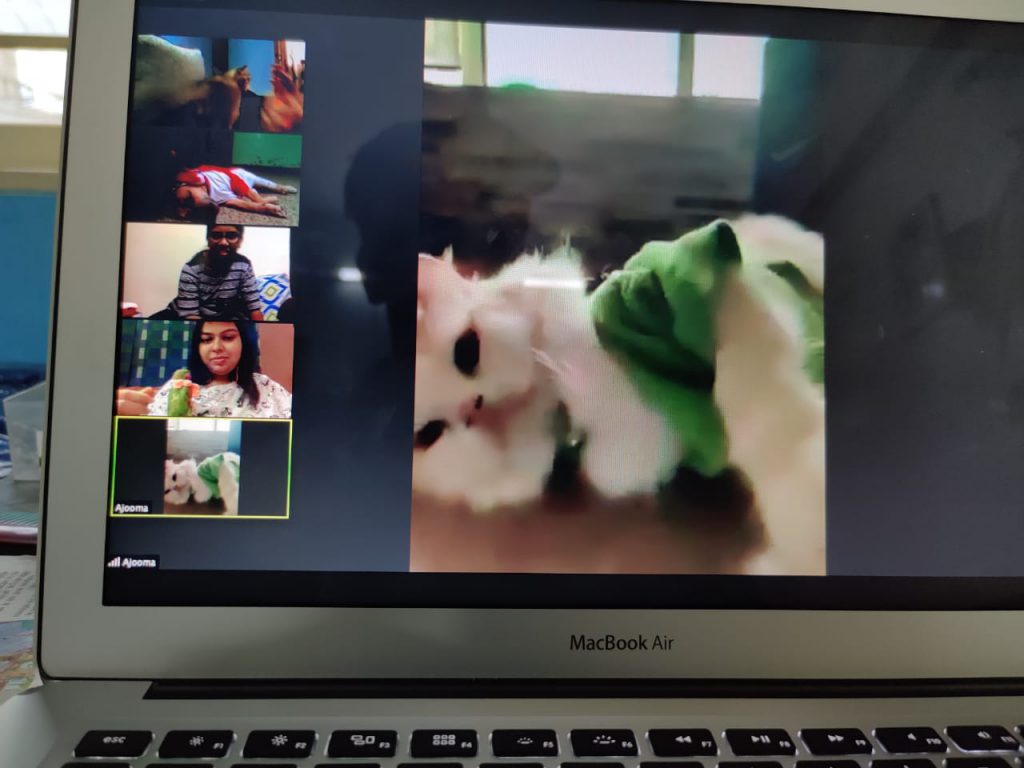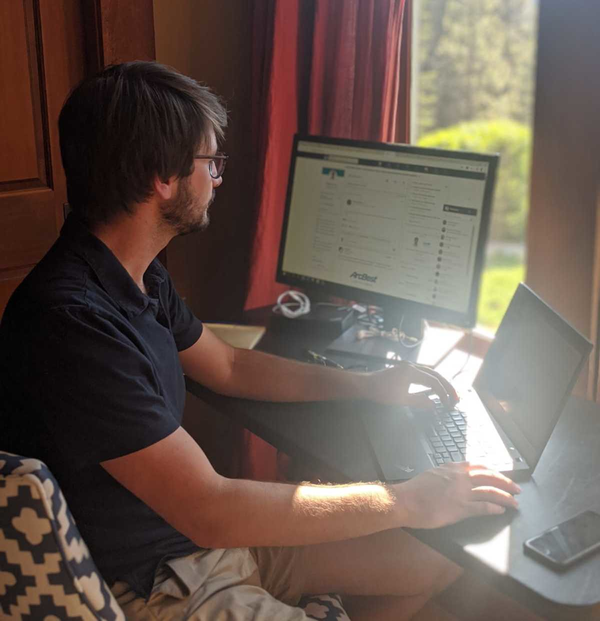Leading successfully through COVID-19 pandemic is a test every business leader is grappling with at the moment. As leaders across the globe face unforeseen, complex challenges, we are inviting business leaders from India and Kenya to share their experiences of dealing with this unprecedented situation.
In this week’s “Business (un) Usual” series we have leaders from India and US share their experiences on managing the business in the pandemic, how they are navigating WFH with their teams, and more.
In this edition, Anoj Vishwanathan, co-founder and President, Milaap and Sandeep Deshpande, General Manager, Redaptive Service Private Limited, and Joe Bell, Manager, Business Operations, Redaptive talk about how they are finding ways to grow in these difficult times.
How has COVID impacted your business or businesses you work with (positively or negatively)?

Anoj: Milaap has always focused on individual emergencies. Though medical causes are our primary focus, we are also open to other social causes. Irrespective of the corona crisis, treatments like chemotherapy, dialysis must go on without any delays. Hence, we continued to do what we have been doing.
When the COVID crisis set in, we opened our platform for fundraisers around the crisis. When the Janta curfew was announced on March 26th, we realized it is going to affect various segments of society and as a policy (natural disasters and relief initiatives) we waived off fees for COVID related causes as well. But we certainly did not expect it to be of this magnitude.
We raised over 100 crores in a short span of time. This overwhelming response resulted in an increase in the cost, but we choose to stand true to our commitment as always. Of course, this had an impact on the business in terms of the cost involved, the traffic on our site increased by 4x, server cost increased by 3x and our communication cost increased by 10x but we made sure that it was under control. We cut other expenditures so that we continue to support these causes.
The way we look at it is – the usual 5% fee that we charge for our campaigns is Milaap’s contribution to the community because the only way to fight a crisis at this scale is to do it together.
 Sandeep: We’ve been able to use this time for internal process improvements at our company. Additionally, we’ve taken time to hire new talent to start during and after COVID. Overall, we’ve made the best of a bad situation.
Sandeep: We’ve been able to use this time for internal process improvements at our company. Additionally, we’ve taken time to hire new talent to start during and after COVID. Overall, we’ve made the best of a bad situation.
What is the biggest impact on your day-to-day life given the recent changes due to COVID?
 Joe: Although I am used to operating via video call for much of my job, COVID has reinforced the need to actively build strong relationships throughout the team as we can no longer rely on grabbing a cup of coffee or sitting down for lunch to communicate and learn about our individual co-workers. COVID has also given us the opportunity to reflect on internal business processes and begin to critically assess and improve upon our systems.
Joe: Although I am used to operating via video call for much of my job, COVID has reinforced the need to actively build strong relationships throughout the team as we can no longer rely on grabbing a cup of coffee or sitting down for lunch to communicate and learn about our individual co-workers. COVID has also given us the opportunity to reflect on internal business processes and begin to critically assess and improve upon our systems.
What’s one tip you have for working remotely? What has been something special you or your company has done to make it a bit easier to WFH and/or preserve team culture and spirit?

Virtual pets day for Milaap team
Anoj: At Milaap, we believe that it is important to invest in employees because how businesses handle things now will undoubtedly determine how they bounce back when things begin to look up. This starts with supporting them through mental health counseling sessions, training, and education that helps develop new skills for a rapidly changing world.
We are glad that we started working towards these at a very early stage. We have tied up with ‘The Alternative Story’ which provides individual and organizational well-being services. We encourage our employees to take up online courses. We expanded our policy to include home office equipment, such as desks and ergonomic chair cushions and UPS too (since power cuts are a routine problem in the city) we are also reimbursing our staff’s internet connection and electricity bills. In the spirit of keeping the business, as usual, we are trying our best to shift our offline traditions online. We had quarantine karaoke, virtual pet’s day, doodling sessions, and a lot more to keep the team connected.

WFH for Joe
Joe: I believe that the most important part of successfully working remotely is learning how to re-create work-life balance. Our team has done a great job of hosting informal game sessions which help lighten the mood and bring people together without the need to think about work!
What’s your favorite thing about WFH?
Sandeep: No commute has been a pleasant surprise.
Joe: My favorite thing about WFH is no longer having to commute!
Do you think that this will signify a shift to more remote work in the long run? Why or why not?
Anoj: It is likely that remote working will last longer than we thought. A lot of companies, especially tech companies seem to be taking the concept seriously resulting in revised work policies. Facebook, Twitter, Shopify, Square, and a lot more companies have opted for the WFH model on a permanent basis. The shift to remote work has enabled many companies to continue to operate and ensure the health and safety of their employees.
This will always be our top priority. The lessons learned from the pandemic will reshape the future of office work especially for e-commerce and IT industries. This means less office space, less commuting, fewer business trips, shorter breaks, and greater focus for employees and this might also reverse the popular trend of job moves to big cities. All of this might inevitably add up to more jobs offering a better work-life balance and a more flexible office life but the key to be successful in the long term requires a structured approach.
Sandeep: I believe this will lead to some temporary changes. However, in the long run, people will want to get out and socialize with their colleagues. The impact of physical interaction simply can’t be replicated on a video call. People certainly miss the ‘chai’ and ‘coffee’ breaks with their colleagues.
Who’s someone that motivates you?
Anoj: There is no one source! In fact, it is the job itself! At Milaap we see stories of aspirations, of hope, and of change every day. Be it the stories of the families keeping the fight alive to save their loved ones from a life-threatening disease, or individuals raising funds to make a difference in their community, an astrophysicist leaving a lucrative job to help farmers to an 11-year-old kid raising 10L through crowdfunding to help the needy during these uncertain times, all these put together drives my motivation to continue providing for the needs of the community as an entrepreneur.
Sandeep: My team motivates me. They bring in a lot of positivity and good energy to all interactions I have either 1:1 or in a group. The way everyone’s stayed optimistic and believed in Redaptive motivates me.
Joe: From a global perspective, it is motivating to see how the world has worked to combat COVID. Although we could always do better, I am motivated by all the people around the world who are doing their best to create a better, safer, and healthier global community. From a local perspective, I am constantly motivated and inspired by the entire Redaptive team. Even before we knew the true impact of COVID, the entire team banded together to improve the company. We’re continuing to learn from this pandemic and set the stage for a successful return as the country continues to re-open.
————————————
Look out for the next piece in this series where we’ll continue featuring advice, insights, and tips from business leaders on how they stay adaptable and move with change. You can also read our first, second, and third features from this series featuring companies in Kenya and India.
At Shortlist, we’re working hard to make sure individuals and companies have the support they need at this critical time. We offer help both to companies looking to hire and to those who are seeking outplacement services to support a team that you may be transitioning. We also have great tools for professionals at any stage of their career development journey. You can learn more about these initiatives and sign up on our platform below ⇓








































